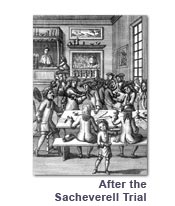Date/Time
Thursday, April 1, 2010
4:00 pm
Location
Royce Hall, Room 314
10745 Dickson Plaza
—a lecture by Mark Knights, University of Warwick
presented by The Center for 17th- & 18th-Century Studies in collaboration with the University of Warwick

This lecture explores how printed images became a routine part of the polemical exchanges of the later Stuart period through a study of topical single sheet images and topical playing cards, two genres that were given a major stimulus by the popish plot in 1678. The production of visual propaganda assumed a new importance in the first age of party politics, particularly as a result of the intense public interest in the popish plot and the trial of Dr. Henry Sacheverell in 1710. Mark Knights argues that visual propaganda played an important and innovative role in the partisan and plot-obsessed culture of the period; that the images had increasingly to answer as well as compete with each other; that there was an overlap between visual print and a wider material and consumer culture; that context and the means of production worked hand in hand; that images visualized polemical concepts and debates (raising interesting methodological questions about how visual material might be included in discussions of political discourse); that print portraits of popular heroes seemed to acquire a new importance; and that, although difficult to measure, their impact can be indicated in a variety of different ways.
Professor Mark Knights comes to UCLA from Warwick University (England), where he is director of the interdisciplinary program for “MA in Eighteenth Century Studies.” Professor Knights received his doctorate from Oxford University in 1990; he is a Fellow of the Royal Historical Society and Member of the Editorial Board of the journal Parliamentary History. His research spans early modern British history but focuses on the political culture of the late seventeenth and early eighteenth centuries. He is particularly interested in the nature of partisanship and the relationship between ideas, discourse and action. In addition to numerous volume and journal articles as well as significant contributions in The House of Commons 1690–1715, edited by Hayton, Cruickshanks, and Handley (Cambridge University Press, 2002). Knights’ book publications include Politics and Opinion in Crisis, 1678–1681 (Cambridge University Press, 1994) and Representation and Misrepresentation in Later Stuart Britain: Partisanship and Political Culture (Oxford University Press, 2005).

